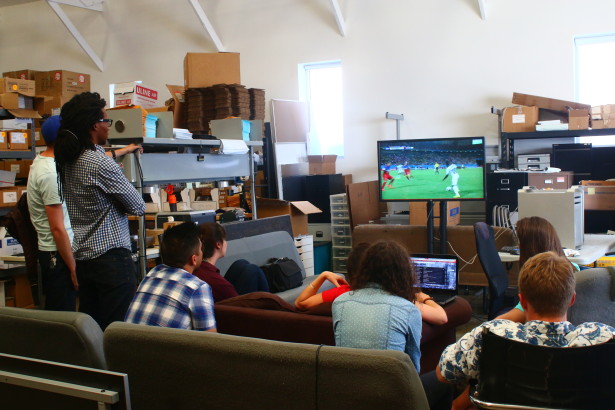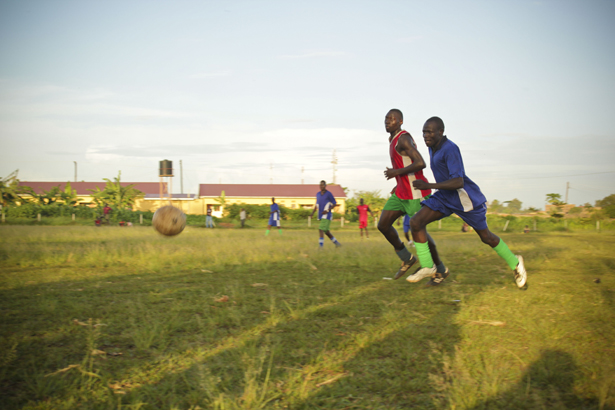Over the past week (and it’s safe to say for the next month) in the Invisible Children office, you can find people sneaking off to our warehouse to watch the World Cup while doing their work. We even have a tiny soccer field set up so that we can play during lunch. There is a spirit of camaraderie among the Invisible Children staff — even when we are rooting for opposing teams.

Some of our interns and staff crowded around the TV in our warehouse, watching a World Cup match.
We asked some of our soccer-enthusiast staff to weigh in on why they think the World Cup is so important (and who they’re rooting for):
Okay, so who are you rooting for?
“Netherlands, of course. Rocking that orange color.” –Saskia (she’s from the Netherlands, so I guess we will have to give her a pass this time)
“Obviously the USA. I think I have also been won over by the Dutch. Their inspired opener against Spain was really impressive.” — Noelle
“United States and Croatia. I’ve spent the past four summers in Croatia, so it would be wrong not to root for them. Plus, just look at them!”– Caitlin
Why do you love the World Cup?
“I love how it unites people behind their respective teams, regardless of the current politics of the moment. The World Cup, as the Olympic Games, unites the entire world. People from Obo, Central African Republic (CAR), to any US city play soccer – it is something we can all relate to in one way or another. It reminds us we are much more similar than we are different.”–Saskia
“I specifically love the World Cup because it’s one of the few events that unifies people globally in a positive way. During the last World Cup I was in northern Uganda, on an assignment for Invisible Children, and at night I would cram into pubs with kids and old men to watch the games. This past weekend, four years later, I was doing the same thing in San Diego. I love knowing that those same kids and old men, and millions, if not billions, of others around the world are doing what I am doing at that same moment.” –Noelle
“The World Cup is the ultimate stage for a country to prove itself, and everyone has a shot. Any given team can win on any given day and underdogs can rise above.” –Caitlin
“I love the world cup because it is simple. We can all get together and cheer for the same team and have a blast.”– Connor
Our staff says it best: soccer not only entertains us, but also unites us. Soccer is like a universal language– from a warehouse in San Diego to a city center in CAR, we understand each other through the art of futbol.

Soccer not only entertains us but also unites us.
Central African Republic is known for its soccer team. In 2012, it won its first FIFA World Cup Qualifier. Though you won’t see them on the field for the World Cup this time around (they lost in qualifiers), they have a long tradition of soccer. Yet the crisis currently facing CAR consequently limits people’s freedom of movement. Activities such as soccer, a national pastime, become dangerous and complicated.
We realize that it is a luxury to partake in the World Cup celebrations and scatter our work days with soccer matches. However, we also believe that freedom and security is not out of reach for our friends in CAR. Our Early Warning Network connects geographically isolated communities throughout CAR and Democratic Republic of Congo in an effort to protect civilians and track LRA whereabouts. We believe our programs, like the Early Warning Network, will bring peace and stability to the region so that people in even the most remote, LRA-affected communities will be safe to play soccer and join together wherever and whenever they like.
Next World Cup, we hope the LRA will no longer exist, communities in CAR and Democratic Republic of Congo will live in complete stability, and we will all join around TVs to watch the 2018 World Cup– from a warehouse in San Diego to the most remote communities in CAR.
As Noelle puts it, “Anytime we can find a common language, that allows for cross-cultural connection, I think that is amazing and important. When we feel connected to others, we tend to treat them with more respect. Soccer is a universal language. The World Cup gives us at least one month of soccer every four years where we more easily see ourselves in others all over the world. I think that’s good for us.”
We believe that we are more alike than we are different, and that where you live shouldn’t determine whether you live.
Think people should hear about this?